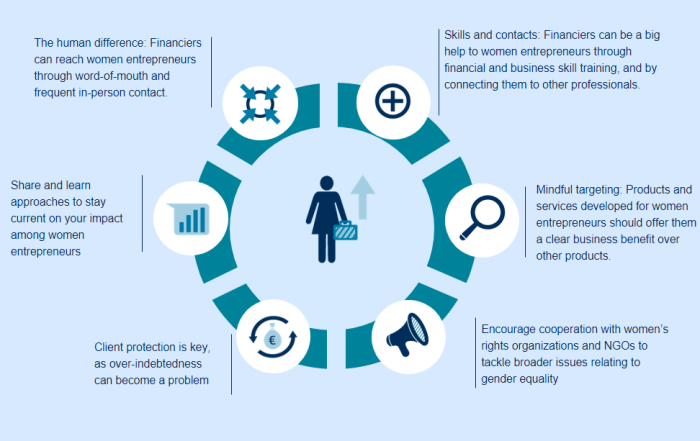


The lack of access to financial services for female entrepreneurs is one of the biggest gender gaps, and a major factor holding back progress towards financial inclusion of women in developing countries.
FMO is proactive in identifying ways to contribute to the full inclusion of women in economic life, and thereby contributing to SDG 10 and SDG 5. To get insight in our efforts, we commissioned an external study of three investments that focused on improving access to finance for women-led Micro, Small and Medium-sized Enterprises (WMSMEs).
The evaluation, which used a qualitative and quantitative mixed-method approach, looked at Al Majmoua (Lebanon), Unibank (Armenia) and The Small Enterprise Foundation (SEF, South Africa). Al Majmoua and SEF are microfinance institutions and Unibank is a midsized universal bank. As they received funding through the MASSIF fund as well as from FMO-A, we analyzed the investments to provide insights for our customers and to inform our financial inclusion approach for the public funds under FMO’s management, as well as for FMO’s own balance sheet activities.
The study provides insights into the development, adaptation and innovation of products and services by the three organizations in reaching WMSMEs, and the extent to which FMO’s funding is additional in terms of providing female entrepreneurs with access to finance. Furthermore, the study assessed how the COVID-19 pandemic impacted these organizations and their WMSME clients.
Overall, the external evaluators concluded that Unibank, Al Majmoua and SEF all contributed to increasing female entrepreneurs’ access to finance. SEF and Al Majmoua take a holistic approach by combining financial services with non-financial assistance. This can greatly improve inclusion as also mentioned in the Non-financial services report by FMO and IFC. Unibank developed a women-in-business loan product to cater to this segment. Unlike SEF and Al Majmoua, Unibank doesn’t have a structured approach to non-financial assistance but rather provides individual financial advice through its loan officers.
The study clearly indicated that the COVID-19 crisis has affected female entrepreneurs. It has exposed the existing inequalities, largely because women tend to work in the hardest hit sectors (e.g., hospitality and food services), have limited social protection, and are the primary family care givers. Of the three organizations evaluated, Al Majmoua’s female entrepreneurs in Lebanon faced more challenging situations during the pandemic than their peers in South Africa or Armenia, due to other confounding effects (a political, economic and financial crisis at the end of 2019 and an explosion in the port of Beirut in 2020).
The evaluation of the impact of FMO’s investments on female entrepreneurs through these three organizations revealed additionality in all cases, albeit in different ways. In the case of Al Majmoua’s work in Lebanon, FMO made a major contribution to its WMSME services and products, particularly as it offered an extended loan maturity period of five years. FMO also played a key role in financing a technical assistance program to create partnerships with Filipino MFIs and identify new financial products such as savings and remittances at a reduced cost for Al Majmoua’s clients who are Filipino migrant workers (about 2,500 Filipina migrant workers).
With Unibank, FMO played a key role in developing its Women in Business (WiB) loan product, making FMO the exclusive contributing factor to Unibank’s WMSME-focused products and services. Moreover, FMO’s commitment to a long-term investment, especially in earmarking it for the WiB product, was a key factor in being additional.
Similarly, FMO contributed to SEF’s WMSME-focused products, and its willingness to provide good lending conditions and flexibility. FMO also provided technical assistance to SEF with developing its Larger Loan Program, and by giving it access to FMO’s network SEF was able to find an external consultant to develop its Female Leadership program.
The evaluation also included a survey on the impact of the loans on the female entrepreneurs for Unibank and SEF. This showed that Unibank clients chose the WiB loan because they believe Unibank has the best commercial offering. Through the WiB product, female entrepreneurs surveyed are accessing credit that is helping them grow their revenues (86%) and increase their client base (23%). Unibank’s clients also claim that the non-financial support has been helpful (61%) and has led to improvements in financial planning and budgeting, accounting, and marketing.
SEF has a key focus on supporting women entrepreneurs in remote, rural communities. Women entrepreneurs receive training on saving money and tracking their financials. These trainings help them improve their approach to savings and to keep track of their funds. Female entrepreneurs surveyed as part of the evaluation indicated that SEF’s loan contributed greatly to increase their revenues (80%) and hire additional employees (64%).
From focus group discussions and a client satisfaction survey, loans offered by Al Majmoua to WMSMEs were having a positive impact before the crisis hit. Clients were very satisfied with Al Majmoua’s services (92%), and the main reasons for satisfaction were good customer service, having a good relationship with loan officers, and attractive loan product characteristics.
From the evaluation study FMO took six main conclusions which are important in reaching WMSMEs. These include the importance of impact measurement, supporting female entrepreneurs with training, mindful targeting and outreach, and cooperation with NGOs
figure: Key takeways

The external evaluators recommended that FMO further aligns its technical assistance to address specific barriers that female entrepreneurs face and encouraged FMO to act as a ‘matchmaker’, facilitating meetings between its customers and women’s right organizations. Increased social performance measurement via data analytics was also suggested, as was an investigation of repeating loan cycles, thus identifying any potential debt trap early on. Lastly, the evaluators recommended investing in research on the impact of COVID-19 on women entrepreneurs, with a focus on social protection measures that FMO and other financial institutions can support.
-------
Photo credit: In the picture women entrepreneur and customer of SEF; picture taken by Opmeer Reports